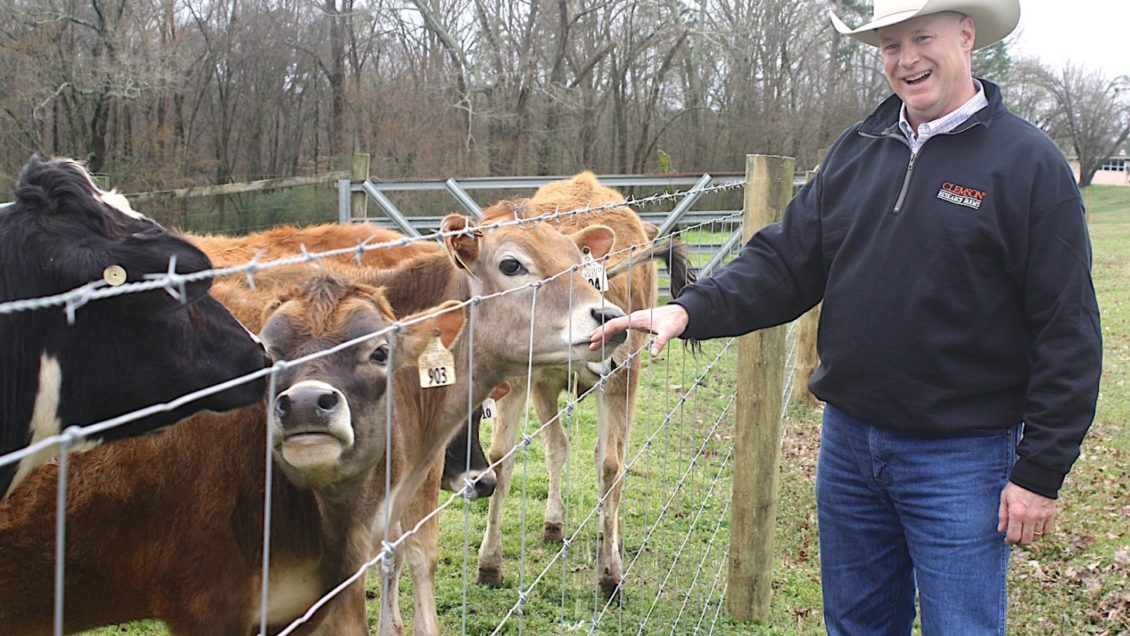
CLEMSON — You don’t have to be an agricultural scientist to understand it: The beef will only be as good as the food it eats.
Matt Hersom, though, is an agricultural scientist: From Oklahoma to Florida, he’s been a student, professor, researcher and Extension specialist trained in both cattle and their pastures and feed.
So Hersom is a natural fit as Clemson University’s new director of campus farms, which encompass research, teaching and Extension Service programs in virtually every facet of agriculture.
With a doctorate in animal nutrition from Oklahoma State University and bachelor’s and master’s degrees in animal science and nutrition from Iowa State University, Hersom most recently served as an associate professor and Extension beef cattle specialist for the University of Florida, which he joined in 2003.
His career is a litany of tackling thorny issues in beef cattle performance, like designing nutritional and supplemental programs to optimize animals’ weight gain and determining ways to increase their ability to utilize the nutrients from the grass they forage.
“Dr. Hersom’s skill-set fits hand-in-glove with the needs of our farms and the many different clients we serve,” said Paula Agudelo associate dean of research and Experiment Station director. “The challenges our industry faces are problems he has faced before with a strong record of success. We’re glad to have him join a team of research, teaching and Extension professionals that meet that challenge every day.”
“Clemson was a natural draw for me. It already feels very much like home,” Hersom said. “The facilities, the research and the educational programs here are very broad-based and well-tailored to the needs of agriculture in this part of the country. I’m especially looking forward to becoming more involved in the agronomic and fruit research programs, which are extremely active and important to our farmers.”

Hersom succeeds John Andrae, who becomes assistant director of Clemson Experiment Station as a whole, overseeing projects at the university’s Research and Education Centers statewide.
The campus research farms are located on and around Clemson’s main campus in Pickens, Anderson and Oconee counties. Each supports the three-fold mission of teaching, research and Extension in Clemson’s College of Agriculture, Forestry and Life Sciences:
- Simpson Research Farm, with about 2,300 acres, is the largest single facility in the group, housing both agronomic and livestock research, Extension and teaching activities, including the Clemson Bull Test facility.
- LaMaster Dairy Center, adjacent to the main campus, is home to research, teaching and Extension projects and provides genetics and dairy products for breeders and consumers worldwide. At 677 acres, the dairy maintains a herd of more than 200 cows from four breeds: Holstein, Jersey, Brown Swiss and Guernsey.
- Musser Fruit Research Center, a 240-acre fruit tree research farm located just across Lake Hartwell from the university, houses the lion’s share of Clemson’s peach research.
- Calhoun Fields Laboratory, also known as “Clemson Bottoms,” focuses on vegetable, field crop and pest management research.
- Clemson Student Organic Farm is a 14-acre research farm on campus that involves students in all aspects of farm management, production and marketing.
- Starkey Swine Center, about five miles from the main campus, is a “farrow-to-finish” operation where swine are bred and raised from birth to market weight.
- Morgan Poultry Center houses a variety of poultry breeds and consists of 11 experimental houses, a feed mill, a hatchery and a workshop just over a mile from Clemson’s campus.
- A Crop and Equipment Services unit provides services to the different farm units, including: hay, silage and crop production; pasture management, vehicle and equipment maintenance, facility maintenance and upgrade, engineering services, grading construction and land management, utility installation, grounds care, carpentry and machine shop services, as well as diesel fuel and gasoline storage.
END
Get in touch and we will connect you with the author or another expert.
Or email us at news@clemson.edu

